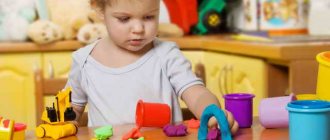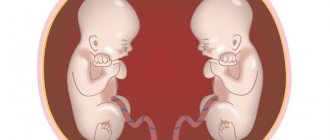There is a 7 year difference between my children. When the second daughter was born, the eldest child felt deprived of parental attention. Everyone had to readjust, and me first of all. Previously, I couldn’t imagine how I would share my mother’s love between two children at once, but it turned out that there is enough of it for everyone to the same extent. Over time, the eldest daughter’s jealousy gave way to a touching attitude towards her newborn sister. Today we’ll talk about how to avoid jealousy between children and achieve harmonious relationships in the family.
Why jealousy occurs
Often, an older child constantly asks mom and dad for a sister or brother. But when they appear, a rather serious problem arises - the older child begins to be jealous of the parents for the newly appeared baby.
This feeling always appears in children of those in families where there are two or more children. Many parents perceive jealousy as the whims of an older child, and do not think too much about how the baby feels, what is going on in his soul.
Adults can easily help cope with negative and new emotions for the older child, become an assistant in raising the second child, and be a loyal friend and close person.
We love our children equally – where does the jealousy come from?
- When a baby is born, parents automatically devote a lot of time to the new family member. As a result, the older child temporarily finds himself in the background, mainly due to the elementary lack of time from mom and dad.
- Previously, all attention was paid to the eldest, but with the advent of another baby, it is no longer always possible to take a walk together, read a book, or even talk secrets in the evening before bed. This causes a feeling of disagreement and jealousy in the older child.
- In addition, the mother constantly does not get enough sleep, and irritation appears that the eldest son or daughter has not encountered before. This causes an additional feeling of resentment in the child.
- Quite often, older children are made nannies, entrusting them with adult responsibilities. This is fundamentally wrong. Children come to the conclusion that if they were babies, they would be loved more.
- In some cases, the older child is sent to stay with his grandparents for a while or a nanny is hired. This leads to isolation and alienation of older children, because they feel cut off from their family, unnecessary and unloved. At the same time, grandparents fully fulfill their responsibilities and help, but this is not mom and dad.
Types of jealousy
There are several main differences in psychology:
- aggressive;
- hidden.
With the first option, it is immediately clear that the child is very jealous. He openly displays negative emotions towards the newly born child and can behave aggressively and demonstratively with his parents. This behavior can be corrected and the baby’s condition can be brought back to normal.
The hidden form is more dangerous. The child becomes withdrawn, often cries, distracted and inattentive, as if he lives in his own world. Parents in the hustle and bustle often simply do not pay much attention to this condition, thinking that it is just a bad mood. As a result, childhood trauma is carried into adulthood.
Regardless of how children express jealousy, working with this feeling must begin as soon as possible. You should not neglect or put it off “for later”: the child suffers greatly at this time and feels especially lonely and rejected.
Main features
- Aggressiveness . It manifests itself in the desire to cause pain to the “competitor”: to hit, push, pinch, and sometimes with the help of fists to make it clear “who’s boss.” At the same time, psychological pressure is also common: a child can offend, call, talk about or persuade a “competitor” to do a bad deed, and then set him up.
- Hyperactivity . If a previously calm child suddenly begins to show excessive activity, his parents should think about the reasons for the child’s behavior, since it may also indicate his jealousy.
- Neurotic reactions . In some children who are sensitive, the manifestation of jealousy is sometimes not behavior, but reactions from the nervous system. For example: hysteria, stuttering, nervous tics.
It happens that a child experiences a feeling of jealousy inside, without bringing it out “for everyone to see.” But the absence of visible manifestations does not mean that this problem does not exist.
In this case, signs of childhood jealousy include:
- Anxiety . It is manifested by sleep disturbances, problems with the digestive system, changes in taste preferences, the emergence of fears and deterioration in academic performance in schoolchildren.
- Change of mood . If suddenly a cheerful and active child suddenly becomes sad and starts crying constantly, this may mean that he is experiencing stress caused by jealousy.
- Lack of independence . Sometimes older children “forget how” when they have a younger brother or sister to do what they knew how to do before. The child becomes like a baby because he thinks that in this case he will receive the same amount of parental attention as his brother or sister.
- Health problems . Due to stress, a child gets sick more often, and chronic diseases worsen for no apparent reason.
Sometimes children use simulation or even trauma to attract attention to themselves, thus blackmailing their parents.
What should be the optimal age difference between children?
in the modern world, many families have learned to plan in advance for the birth of a second and subsequent child. This approach is caused by many factors: you need to find housing that would allow you to allocate space for all family members; financial readiness, because raising children is not a cheap matter, and there are many other issues.
But when parents are ready for the birth of their second baby, they do not assume that the age difference between children plays an important role. What to prepare for, what kind of relationship between elders and younger ones, based on their age difference?
Weather
- Many couples believe that it is better to “shoot it off” right away, give birth to two children in a row and never return to diapers and undershirts. This approach has its pros and cons.
- When children are very young, caring for them is approximately the same, just as the daily routine allows them to manage a lot. But over time the situation is changing. The elder begins to walk and talk, requires a lot of time and attention - there is an active process of learning about the world around him.
- The youngest is still in a state “near” his mother, day and night. And this takes all your emotional and physical strength. Subsequently, similar children spend a lot of time together. Some people manage to send them to kindergarten and school at the same time.
- The advantage is that jealousy is kept to a minimum, because children receive the same attention from their parents as they grow older and are too close to distance themselves from each other due to negative emotions. And even in the initial period of the possible appearance of jealousy, they still cannot realize this feeling.
- Minus: the older one begins to slow down his development, adapting to the younger one. The development of speech and other skills may slow down.
Advice : adults need, especially in the first few years, to try to correctly distribute responsibilities and devote the same amount of time to children, to ensure that the eldest develops according to the indicators of his age and does not feel deprived.
2 and 3 years difference
At this time, the baby is actively developing. Questions “why” and “why” are heard from morning to night. A lot of attention is needed. The child begins to perceive himself as an independent person, separate from his parents.
He already sees and feels that with the birth of his second baby they stopped providing him with so much care. But this is largely an unconscious feeling. To regain mom and dad's attention, he may become painful, thus signaling a lack of care.
Do not forget about the crisis of 3 years, when the child begins to realize that he is separate. He is interested in everything around him, but he is not yet able to see the situation from the outside the way adults see it.
Advice : do not leave your older child without due attention. If you miss this important stage, then your insufficient support may harm the full development of the older offspring’s personality. Organize your day as intelligently as possible so that there is enough care for two children.
4 years difference
- The older baby is already calmer and more reasonable. He knows how to do a lot himself: get dressed, go to the toilet, wash his hands, eat.
- His consciousness is more developed - he understands that there is another child who needs attention.
- If you correctly explain from the very beginning, with love and respect, that nothing has changed for him, mom and dad also adore him, there’s just a little less time, then the child will become a faithful assistant. Feelings of jealousy will be minimal.
- This age difference is considered the most acceptable. When the youngest child grows up, the children get along well and play together, and, as they become older, they do not conflict.
The difference is 6 – 7 years
With such a gap and more, according to psychologists, children have practically no common interests. It is not two who grow, but 1 + 1, that is, each one must be dealt with separately, taking into account the age group.
The advantage of this difference is that the older child is already quite independent, can help his mother, and in the future even pick up his sister or brother from kindergarten and school. He is already the defender of the youngest in the yard, and in any team. The second child often takes an example from the older one and tries to imitate him in everything, which is not bad at all if the family is prosperous.
Regardless of age, parents should prepare the older one before the arrival of their second child. Only in this case, family relationships will not deteriorate, and the children will be friendly in the future.
Give children the right to independently resolve conflicts with each other.
No matter how competently parents behave, minor quarrels will still arise between children, this cannot be avoided. But mom doesn’t have to take on the role of judge in every conflict. Give children a chance to come to reconciliation on their own. This is one of the best ways to teach them to show empathy and respect for each other.
Do kids fight over toys? Wait, don't interfere in trying to divide the cubes equally between them. Give an “ultimatum” - if after 5 minutes they themselves do not decide what to take, you will take the toys for yourself. You will see that they will very quickly forget about the quarrel and begin to play together.
Of course, more serious conflicts will occur than the “division of property.” Solving some problems will certainly require your participation so that the conflict does not inflate to the size of a catastrophe. It's up to you to decide when to intervene and when to step aside.
Recommendations for parents on how to avoid jealousy
- Have conversations with your child, tell him how he was very tiny, learned to sit and eat, sleep on his own and dress himself. Children love stories about their childhood and begin to relate differently to their brothers and sisters. Choose a time (1-2 hours a day is enough) when you will devote time exclusively to your older child. This will give him stability and an understanding that he is important in the family.
- It is important to distribute love, care and affection equally. Hug and kiss your older child more often, and sincerely praise him for his successes. He should not feel lonely and unloved.
- It is imperative to correctly distribute roles in the family. Explain to your elder that he has great advantages: he can go to bed later, choose his favorite dish and read books to his liking, and he is also able to choose a hobby and a group of interest.
- At the same time, tell me how wonderful your sister or brother is growing up. Share your emotions and ask for advice. The child will feel important and realize that he is older, more mature, and responsible.
- If jealousy does seep into the relationship, then don’t stop - continue to patiently explain, only in a respectful manner, that you love equally. To confirm, periodically “swap” the roles of the children: ask the younger one not to take toys from the older one, for example.
- Set aside a separate corner for an older child so that he knows that he has his own territory. Be careful - do not call children the same affectionate words. Let everyone have their own individual pet name. It is important to highlight the uniqueness of each child.
Stop snitching. If punishment is due for an offense, then let both bear it equally. But also praise the two. To make children more friendly, give them common, simple tasks that do not involve obvious leadership.
It is important for parents to understand that their active participation in eliminating the jealous attitude of their children must begin on time. Preparing for the birth of a second child is mandatory. The harmony and happiness of all family members depends on this.









